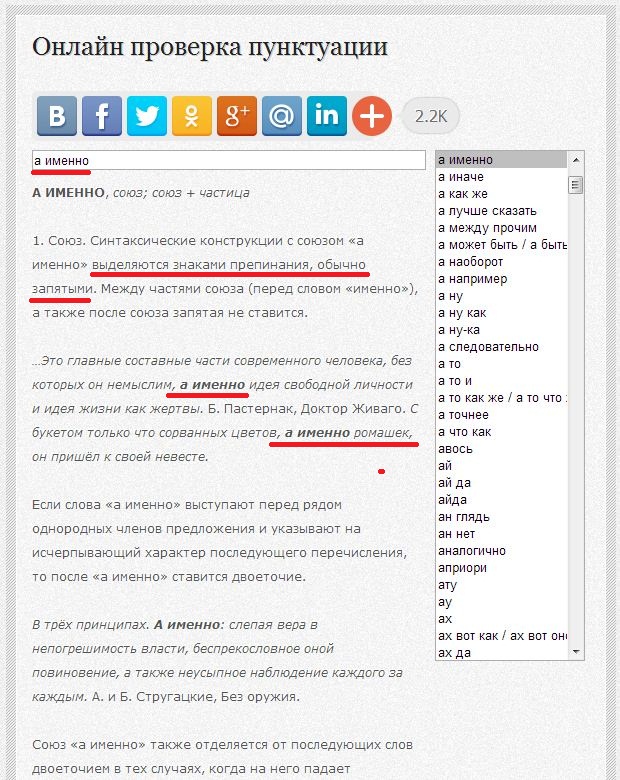Place commas online. Isolation of definitions, applications, additions and circumstances. Well, in a complex sentence, a comma is always needed before the conjunction “that”
Greetings to all!
Many, for some reason, do not give due importance punctuation(i.e. correct placement of punctuation marks: commas, periods, etc.). Meanwhile, one or two signs can significantly change the meaning of a sentence!
Example 1
"Execution cannot be pardoned"(catch phrase from the famous cartoon). Try putting a comma after the first word, and then after the second - in my opinion, comments are unnecessary here.
Example 2 (lifetime)
Why have you arrived?(simple SMS). If you do not understand the meaning of the phrase correctly, you might think that the one who asks is dissatisfied that someone has arrived. They may be offended by such an SMS...
Have you arrived?(the same SMS, but with a comma). The comma in this case makes it clear that they are interested in the very fact of arrival, and most likely want to see each other quickly...
So, enough of the lyrics. Below are several online services that will help you quickly and efficiently help you with punctuation, check your text and tell you how to place commas...
Note! By the way, if you have a program on your computer Microsoft Word- then it perfectly checks the spelling and punctuation of the text. For example, on some of my work computers there is no such program, I have to be content with WordPad and use similar services...
How to check the spelling of text in MS Word is shown in the screenshot below.

Spelling
![]()
A very interesting service for checking spelling, punctuation, tautology - in general, spelling. As an example, I took a small excerpt from my article and copied it into the "Spelling" window...
The service, surprisingly, checked the text very quickly and reported the errors found. What’s convenient: the column on the right shows the number of errors found, and they are divided into sections: punctuation, typography, etc.
I would like to immediately note that the service shows quite good results in terms of the quality of the check. In general, I recommend testing it.

Of the minuses: The service requires registration, although it offers the use of one of the social network accounts.
ORFO-online

Another very high-quality service for checking punctuation and spelling online. There is no need to register here, just copy the text into the window and click the check button. In a moment, you will be provided with a checked text, where incorrect words, places where there should be commas, extra spaces will be underlined.
For example, several missing commas and several extra spaces were found in my text. If you click on the underlined place, "ORFO" offers a correction option, and also indicates what the error is. Comfortable!
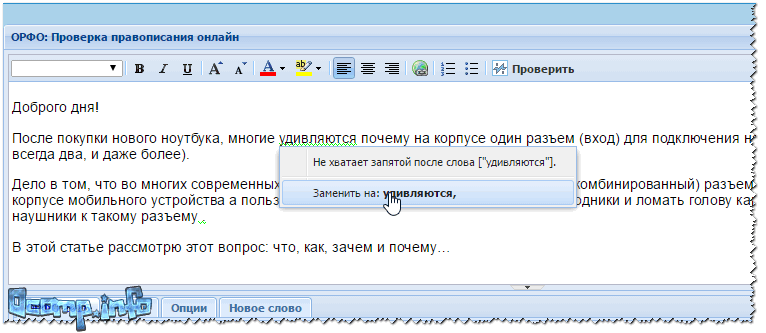
Language Tool

An excellent service for checking spelling, everything is checked at once in a complex: spelling, punctuation, style, etc. The quality of the check is very high, extra spaces, missing commas, mistakes in words - the Language tool finds all this quite skillfully, and highlights all problem areas in pink color (the program contains more than 600 rules of the Russian language!).
By clicking on the highlighted area, you will be offered several options for correcting the error; you only need to select how you want to correct the problem area in the text.
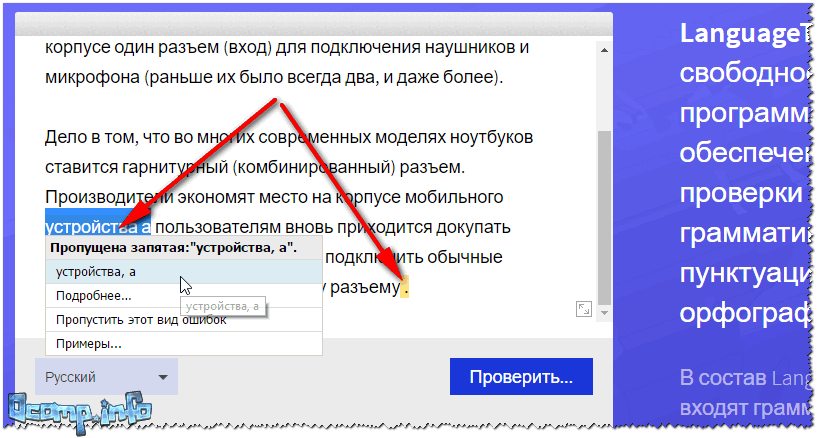
What else I want to note about the Language Tool:
- availability of add-ons and extensions for browsers: Firefox, Chrome;
- availability of an add-on for free analogues of Word - LibreOffice/OpenOffice;
- add-on for Google Docs;
- independent program, etc.
In general, this is a whole set of programs and online checks that help correct large text “foot wraps”. In general, I recommend it!
TEXT.ru
![]()
This service, in addition to checking spelling, checks the text for plagiarism (so you can know whether it has been published by someone before and whether the information is unique). In addition, the service conducts another check - it analyzes the text and determines how much “water” it contains, how spammy it is, how many characters it contains, etc.
As for checking punctuation, the service works very well. Found problem areas will be highlighted in pink: when you click on them, you will be offered the correct answer (see screenshot below).

There is no need to register for the service.
Word editors online

Note. By the way, if the proposed services are not enough, I recommend that you read my article about analogues of Word and Excel (it also talks about online analogues):
If Word is not installed on your computer, but you have the Internet, why not use the online version of Word?! In fact, there are quite a lot of services of this kind. In addition, their use solves another problem: formatting text, working with signs, pictures in the text, etc. Yes, and a finished document in .DOC or .DOCX format - you can also open and remake it for yourself...
A very good service, almost the same Word as if it were installed on a computer. True, to use it, you must have Account Microsoft. Registered?
A popular service from Googl"e. To access it, just register (you don’t have to enter anything except your email). The service itself allows you not only to open and edit ready-made documents, but also to create your own and check their spelling. By the way, by default, the check is very good (and sometimes I don’t check anything at all), I recommend connecting additional dictionaries - for example, the same Lamguage Tool that I recommended above.
Convenient online version of Word 2003-2007 (the interface is almost indistinguishable). Allows you to do almost all the same things as Word installed on your computer. A distinctive feature of this version: the ability to open new windows to work with several documents at once.
This, of course, is not all versions of Word online - but my task in this subsection was to give a tip on this possibility 😉 ...
This concludes my “lesson” on punctuation marks. Good luck!
Instructions
Determine the role of commas in a sentence. Single characters are used for separation, paired characters are used for selection. Compare: “The heat is unbearable, the treeless plain and the expanse of heaven” and “The stripes of pre-dawn fog, curling like a blanket over the clearing, drooped and went into the black darkness of the forest.” In the first case, a comma separates independent sentences as part of a complex syntactic construction, in the second, the participial phrase is highlighted.
Most often, separating commas are used for homogeneous members of a sentence connected by a non-union connection: “Barges, boats, boards, logs, roofs, uprooted trees rushed along the waves.” Please note: the separating comma is not used in stable phrases (talk about this and that, woke up at the crack of dawn) and is not used in compound names (cupronickel tea spoons).
Determine whether repeating conjunctions are used between homogeneous members in the sentence. In this case, commas are placed, in contrast to constructions with single coordinating conjunctions. For example: “I managed to be both at the skating rink and at the theater”; “I managed to be at the skating rink and at the theater.”
Always use a separating comma before adversative conjunctions (and, but, however, but, yes): “The smell of linden blossoms everywhere, and especially here.” Please note that the conjunction “yes” can be a connective, similar in meaning to the conjunction “and”. In this case, a comma is not placed in front of it: “I was tormented by anxiety and a thirst for change.”
A simple sentence can be complicated by isolated secondary members of sentences that stand out intonationally and in meaning, thereby acquiring relative independence. When deciding whether to highlight a secondary member of a sentence with paired commas, consider:
- what word (part of speech) it refers to;
- how is it expressed, widespread or not;
- its location relative to the main word (before it or after it, separated or not by other members of the sentence);
- the presence or absence of additional semantic shades (for example, reasons, concessions).
When isolating definitions, applications, additions or circumstances, be guided by specific punctuation rules, and not just pronunciation intonation.
Use paired commas if the sentence is complicated by constructions that are grammatically unrelated to its other members. Such constructions include addresses, introductory words and introductory sentences. For example: “My love, will I forget you?” − the phrase “my love” is highlighted in the sentence; “He believed, of course, everything” - the introductory word “of course” is highlighted with paired commas.
Separate simple sentences within complex sentences with commas. To do this, find the grammatical basics, determine the boundaries of simple sentences and arrange the signs. For example, in the sentence “Spring shone in the sky, although the forest was still covered with snow like winter,” there are two grammatical stems - “spring shone” and “the forest was covered.” This is a complex sentence and must be separated by a comma.
Written speech is difficult in that there are a number of rules that you need to know in order to be considered an educated person. The presence of spelling and punctuation errors can adversely affect the impression of business partners, employers and lovers. Learning to place correctly commas!
You will need
- Russian language textbook, knowledge of punctuation rules
Instructions
Determine the composition of the proposal. Sentences can be simple or complex. Simple ones have one grammatical basis, complex ones have two or more. The basis is the subject (answers the questions: who? what?) and the predicate (answers the questions: what does he do? what did he do?). For example, a simple sentence: “Sasha bought a cake, chocolate and waffles” (“Sasha” is the subject, “bought” is the predicate, homogeneous objects are separated by commas: “cake”, “chocolate”, “waffles”). Difficult sentence, such as: “Dad told her that we would arrive late” (first base: “dad” is the subject, “said” is the predicate, second base: “we” is the subject, “will come” is the predicate).
Consider a simple sentence. IN simple sentences Commas, as a rule, separate homogeneous members of a sentence, for example, when listing: “I brought yellow, red, blue balls.” The application after the personal pronoun is separated by commas on both sides: “I, a journalist, could not believe that the newspaper was published by one person.” We also put commas in expressions with explanatory turns (that is, (a) namely, even, especially, mainly, including, for example, in particular, and moreover) and introductory words (apparently, so, probably, probably). Additions with prepositions are distinguished except, apart from, excluding, with the exception of, including, over: “Who, besides his mother, will feel sorry for him?” Commas are also used when highlighting participial and participial phrases (moreover, participles are highlighted only when they appear after the word being defined): “The land, watered by rain, became black and cold” (participial phrase). “Approaching the station, I lost my hat” (adverbial phrase).
Determine the type of complex sentence. If you find two grammatical stems in a sentence, you should determine its type: coordinating or subordinating. In coordinating, simple sentences are connected without a conjunction or with the help of the conjunctions a, and, but. In a complex sentence you will see the dependence of one part of the sentence on the other and conjunctions such as, as if, what, who, when, since, if, than... that, where and others.
Analyze a complex sentence. All the sentences included in its composition are equivalent, they, as a rule, can be separated from each other: “We looked outside the window, mom was preparing dinner.” The presence of the prepositions a, but indicates the need for a front comma. A comma is placed before a preposition and in a complex sentence, for example: “In the summer there was sweltering heat, and we went south.” Rest commas are arranged according to the same rules as in a simple sentence.
Analyze the complex sentence. A comma separates the simple sentences that make up it, and there is a main clause, and there is a dependent clause(s). Dependent (subordinate) clauses in a complex complex are marked by the presence of a conjunction: While we were looking at the field (dependent clause), the girl ran away (main). From the main one we can ask a question to the dependent one. This is how we separate one from the other, this is how we find out exactly where the comma is placed.
note
If simple sentences have a common secondary member, an introductory word, an address, a comma is not used: An orchestra played in the city garden and a folk choir sang. They also don’t put a comma in a complex sentence with a general clause: “When I returned home, there was no longer any light in the window and grandfather must have gone to bed.”
If you are in doubt about whether to use a comma, change the phrase so that the problem disappears: break a complex sentence into two simple ones, reduce the number of introductory words, replace adverbial phrases with subordinate clauses.
Sources:
- Punctuation within simple sentences
- like so and commas
A participle is a verb form that has the properties of a verb and an adjective. A participle with dependent words forms a participial turnover. It can often be confused with a verbal adjective. How to determine who is involved turnover and how not to confuse it with other parts of speech?
![]()
Instructions
First, identify the participles in the active voice. Suffixes will help you do this, with the help of which participles are formed from verbs: -ush-, -yush-, -ash-, -yash-. For example, walking, thinking, lying, smoking. To form past participles, the suffixes -вш-, -ш- are used. For example, thought, expired. Participles in the passive voice cannot be dealt with so easily, because... they are formed with the help of the suffixes -em-, -im- (readable, persecuted), -en(n)-, -n(n)-, -t- (entrusted, removed, locked). Do not confuse them with verbal adjectives, because... The participle also agrees with the noun and has gender, number and case. For example, “tired and exhausted, he was escorted home.”
Let's look at the distinctive verbal features of participles in more detail. The participle, like the verb, can be perfect or imperfect (bathed and bathed). It can be in the active or passive voice (“the writer who wrote the book” and “the book written by the writer”). For real participles it is possible to determine transitivity. For example, doing is a transitive participle, and walking is an intransitive participle. The participle has such a sign of a verb as reflexivity (walking is a non-reflexive participle, and walking is a reflexive one), and can also be in the present and past tense (“a student completing a task” and “a student who completed a task”).
This is a verb. In addition, correctly placed commas help to convey the exact meaning intended by the author in the text.
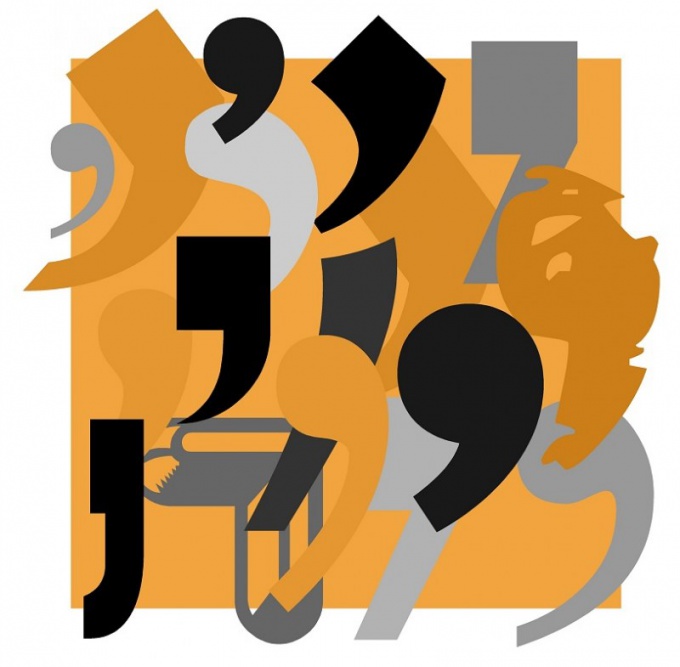
In the study of spelling, punctuation marks in general and commas in particular. Pay attention to the fact that very often, depending on the placement of punctuation marks, the intonation of the spoken text and even its meaning change. Using commas, the author identifies intonation and semantic segments. These include introductory phrases, isolated members of a sentence, addresses, homogeneous members of a sentence, as well as simple sentences that make up parts of a complex one. Using a simple example, let us consider how different positions of commas in the text can change the original meaning of a sentence to the opposite. An example is the short but very entertaining phrase: “Execution cannot be pardoned” from the famous cartoon. In the example commas none. First, let's see what meaning the phrase will take on if a comma is placed after the first word: “Execute, cannot be pardoned.” Now notice how the meaning of the phrase changes significantly when a comma appears after the second word: “You cannot execute, but have mercy.” Comparing these examples, it is easy to come to the conclusion that the meaning of the sentence directly depends on where the comma is placed. That is, a comma can show the reader which word should be emphasized and how to correctly use intonation coloring in order to correctly convey the meaning. Let’s use another example: “She probably still drinks coffee and cookies in the morning” (Fadeev). Commas highlighting the introductory word “probably” indicate that this segment of the sentence is not related to the information contained in the text. The highlighted section should be pronounced more quietly and faster than the rest of the sentence. From the examples given, it becomes clear how important the role is played commas, conveying the structure of the sentence, its meaning and intonation.
A simple sentence is one that has only one grammatical stem in its composition. Moreover, it can have many minor members, which in some cases need to be separated by a comma.

Isolation of definitions, applications, additions and circumstances
The definition is separated by commas if it stands next to the personal pronoun: “She, beautiful, sat and was sad.” Also, commas are placed if the definition is behind the word being defined: “The sky, bright and majestic, smiled with the sun.” If the definition comes before the word being defined and the circumstances are significant, a comma is also necessary: “Rejected by everyone, he stood behind the house.”
The application must be separated by commas if it appears next to a personal pronoun: “We, the cooks, believe...”. It also becomes isolated if it comes after a proper name: “Anna, the hostess, remained sitting.” If the application contains the words “even”, “for example”, “that is”, “or”, “especially”, “by name”, a comma is added: “Few people loved him, especially me.”
Additions with the prepositions “except”, “besides”, “excluding”, “over” are separated by commas: “No one, including Fyodor, pitied Anna.” Circumstances with a clarifying meaning are highlighted in a simple sentence: “He left us here, on the shore, near the old pier.” If the circumstance has the preposition “despite”, it also requires isolation: “Despite the pain, the soldier continued to walk.”
Comparative and explanatory phrases
Comparative phrases in a simple sentence are usually separated by commas. The comparative phrase has the conjunctions “as”, “exactly”, “as if”, “as if”, etc. “He laughed like he was crazy.”
Explanatory phrases with the words “that is”, “precisely”, “even”, “including”, “mainly”, “moreover” require commas. “She’s just a friend, not even a relative.” Addresses are always isolated in a simple sentence: “Dear mother, good afternoon!”
Availability of introductory constructions and homogeneous members
If a simple sentence has an introductory construction, it requires highlighting. These can be single words: “Probably everyone died.” There may also be sentences: “The door, as he said, was broken into.”
A comma in a simple sentence is placed between two or more homogeneous members without conjunctions: “The boys grew up, got stronger, became more mature.” If they have a repeated conjunction, a comma is also needed: “Neither brother nor sister suspected anything.” The presence of homogeneous members of the conjunctions “a”, “but”, “yes” also indicates the need for a comma: “He was scared, but did not show it.”
Comma before the conjunction "as"
A comma before the conjunction “how” in a simple sentence is placed in a number of cases. If the union enters into a comparative turn: “A prince came out, handsome as the moon.” If the conjunction “how” is included in the introductory construction: “On the way, as usual, he joked and laughed.”
A comma is placed before the conjunction “how” if it is used with a causal meaning: “As a beloved friend, Anna will never leave him in trouble.” If there is an “and” after the conjunction: “Animals, like people, have different characters.” A comma is needed in the expressions “no one else but”, “nothing else but”.
Video on the topic
Greetings to all! As everyone knows, even one punctuation mark can radically change the meaning of a sentence. Many people remember the sentence “execute cannot be pardoned,” where a comma can change the meaning of what is written. So, when writing any text on a PC, you need to use punctuation marks correctly, since the content depends on it. In this article I will tell you, how to check punctuation and spelling online.
Of course, it is best to use office software to check text. Microsoft application Word, which underlines words with grammatical errors and missing punctuation. But there are cases when Word is not installed on the computer, and the text urgently needs to be checked for spelling and punctuation. Under such circumstances, I use special online services. Below we will consider such services for check punctuation and spelling online.
(banner_google1)
Text.ru – check spelling and uniqueness of text online
Quite a decent service for checking error tests. In addition to the number of characters with and without spaces, the number of words, spam and water, this resource can easily check sentences for spelling errors and uniqueness. In general, the literacy of a text checked by the text.ru service will be almost maximum.
In simple sentences, the service can easily identify missing characters, but if the check concerns complex sentences, then text.ru cannot always correctly place punctuation marks in the text. You don’t have to worry about grammatical errors – the service finds them all and highlights them. Link: http://text.ru/spelling
ORFO - the best resource for online text checking
Highlights all errors this service, just like in Microsoft program Word: errors in words are highlighted in red, and places where there is no punctuation mark are highlighted in green. Sometimes I personally use this service if I don’t have it at hand office applications. It checks the text quite quickly, and in a matter of seconds I can get an analysis of an article of 2000-4000 characters.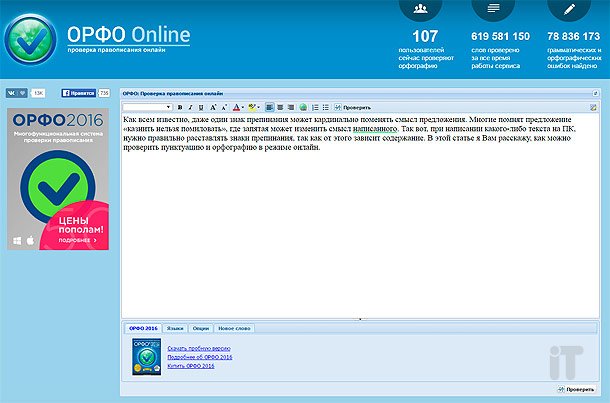
To check sentences for errors, you need to copy your text, paste it into the ORFO window and click on the “Check” button. After checking, you will see underlined words if there are errors in the text. There is only one disadvantage of the service: you can check text of no more than 4000 characters. However, this is not a serious problem, since large text can be checked in several stages, dividing it into 4000 characters. Link: http://online.orfo.ru/
(banner_google3)
Language Tool - checks grammar, spelling and punctuation
LT is a good service that, like its predecessors, is capable of checking text for grammar, punctuation and spelling in online mode. Just like on similar resources, misspelled words are highlighted in pink. Where punctuation marks are missing, the resource will be highlighted in orange.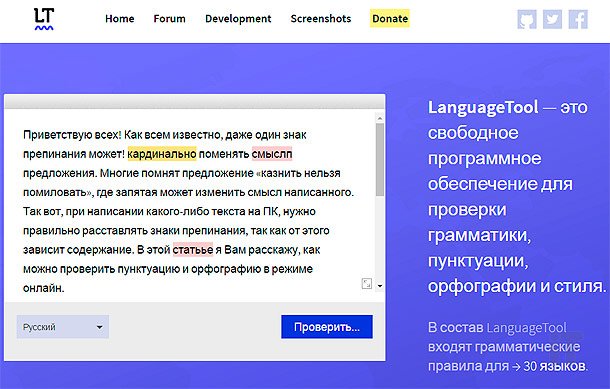
In general I recommend it as free service It’s not even bad, especially if you need to process the text very urgently. However, the main direction of the site is advertising software for PC, which can check text in 30 languages. Link: https://languagetool.org/ru/
5-ege.ru - another text checking service
Checks grammar and spelling. There is only one drawback, as I believe: punctuation is checked in a separate window, and spelling in another, which is not very convenient. However, the service is free, so you can spend a little more time checking your text as thoroughly as possible.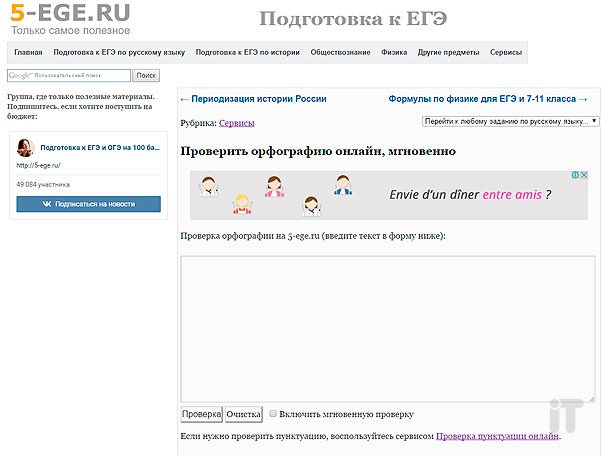
As I noticed, not one of the services described above can cope with finding punctuation errors like this one. You can only check one sentence at a time, but such a check will be thorough and correct. I can’t say anything bad about the 5-ege.ru service, I had to use it several times and it always helped me out.
Links: check spelling in the text http://5-ege.ru/proverit-orfografiyu-onlajn/
checking punctuation in the text http://5-ege.ru/proverka-punktuacii/
I think I have shown you enough resources for checking text, especially since they are the most popular and effective. Now you know how to check text punctuation online. If you have any questions, ask in the comments. Thank you all for your attention and see you again!
Punctuation marks play an important role in the perception of written text. You can't argue with that. Let's take an example - the phrase “Execution cannot be pardoned,” which changes its meaning to the opposite depending on where the comma is placed. Correctly placed punctuation marks are the key to ensuring that the text will be understandable to whom it was addressed. However, even we who have successfully completed school (I passed by here) often experience difficulties with punctuation.
Many people remember from school that a comma is always placed before “what”. When it comes to punctuation, the word “always” is best avoided. For example, a conjunction can occur as part of expressions that are integral in meaning (they are also called indecomposable combinations), and then placing a comma in front of it will be a mistake. Correct, for example: get what you need, do what you want, have something to do, do it properly, show up as if nothing had happened, achieve it at all costs, don’t go where you shouldn’t, spend the night where you have to, the picture is amazingly good , the job is what it takes.
In a complex sentence, a comma is always needed before the conjunction “that”! Not always! And here it is better to forget the word “always”. Yes, a comma is placed before a conjunction joining a subordinate clause. For example: Some slacker invented that there is love on earth. Or: Wait for the yellow rains to make you sad. But if the subordinate clause consists of only one conjunctive word, there is no comma before it: We are going to meet, but we don’t know when yet. The girl didn’t show up for the date and didn’t even explain why.
More about the difficulties that await you in complex sentences. They may also have something like this: one main sentence has several subordinate clauses. In this case, the same rules apply as for homogeneous terms. If the subordinate clauses are not connected by conjunctions, a comma is placed between them: How I want to come up with a way for happiness to be ahead, to return to childhood at least for an hour, to catch up, to save, to press to my chest... And if between the subordinate clauses there is a non-repeating conjunction and, a comma is not placed neither before nor after. An example of this rule was in the text of the Total Dictation - 2016 and led to a large number errors. And rightly so: It was clear that the troops needed a truce and that the only opportunity to declare it could be the Olympic Games...
And if between the parts of the sentence there is not a conjunction “what”, but a conjunction “and”? Such sentences are called compound sentences. By general rule in them a comma is placed before the conjunction. For example: Gold rusts and steel decays. But there are pitfalls here too. So, we do not put a comma if a complex sentence includes interrogative or exclamatory sentences: Who are these texts addressed to and what is their meaning? How funny he is and how stupid his antics are! A comma will also be an error if two simple sentences in a complex sentence have a common secondary member: From sitting for a long time, his legs became numb and his back ached.
There are no conjunctions in a complex sentence. A complex sentence, between the parts of which there are no conjunctions, is called non-union. The punctuation marks in it depend on the meaning of the phrase. For simple listings, use a comma. If the second part explains, reveals the content of the first part, indicates the reason for what was mentioned above, a colon is necessary. If the second part, on the contrary, contains a consequence, a result, a conclusion from what was discussed in the first part, we will put a dash. Compare: She married him, he began to earn more (a simple listing of events). She married him: he began to earn more (she decided to become his wife because he began to earn more). She married him - he began to earn more (the increase in his income was a consequence of his marriage).
When do you need a sign before "how"? A comma is placed before the conjunction “how” if it joins a subordinate clause: I remember the first time I came to this city. A comparative phrase with a conjunction stands out, such as: Like a straw, you drink my soul; The air is clean and fresh, like a child's kiss. But there is no need to put a comma if the conjunction as has the meaning “in quality”, for example: I am telling you this as a linguist (= “I am a linguist”, there is no comparison here). A comma is not placed even if the phrase with the conjunction as is part of the predicate or is closely related to it in meaning, for example: The son did not call, and the mother was sitting on pins and needles (without the phrase with as the predicate makes no sense here).
How is everything in simple sentences? A simple sentence (one with only one grammatical basis) can be complicated by introductory words and inserted clauses, participial and participial phrases, clarifying, explanatory and connecting constructions... And here is the time to name reference guides on punctuation, where all these constructions are written in detail. The most complete is D. E. Rosenthal's reference book "Punctuation". And, of course, the complete academic reference book “Rules of Russian Spelling and Punctuation”, edited by V.V. Lopatin, is indispensable for all those who write.
Introductory words. Introductory words are set off with commas, many remember this: Onegin, I was younger then, I think I was better... Another rule is less often remembered: if the introductory word is at the beginning or end of a separate phrase, then it is not separated from the phrase by any punctuation mark: This The film was shot in some Soviet city, it seems in Riga. This film was filmed in some Soviet city, in Riga, it seems.
Words that are mistakenly separated by commas. It must be remembered that such words and combinations as literally, as if, in addition, in the end, are not introductory and are not set off with commas, as if, in addition, in the end, hardly, as if, even, as if, as if, besides, meanwhile, for sure. However, the word raises many questions. Remember: if it is at the beginning of a sentence or between parts of a sentence and is used as a conjunction but, the comma after it is erroneous: All these rules are difficult to remember, but necessary. Or: This conversation can continue for a long time. However, it's time for us to have lunch. However, an introductory word can only be in the middle of a sentence: It’s time for us, however, to have lunch.
Why aren't many of these rules taught in school? School textbooks really don’t cover all punctuation rules. There is nothing wrong with this, because biology lessons do not provide all the information known to academicians, and school physics lessons do not prepare doctors of physical and mathematical sciences. The situation is the same with Russian language lessons: the school’s task is to provide basic information about the Russian language and spelling, and not to prepare professional editors and proofreaders. To become a specialist in the field of the Russian language, you need to study further - just like to master any other profession.
The most ridiculous punctuation mistake. This is a comma within an address. From school, almost everyone remembers that addresses are separated by a comma: Hello, Yura! Hello mother! Good evening, Ivan Petrovich! And they put a comma in such a place, for example: Dear Ivan Petrovich! Dear Kate! But the comma here is a mistake, because the words respected, dear, beloved, etc. are part of the address. Correct: Dear Ivan Petrovich! Dear Kate! But: Good evening, dear Ivan Petrovich! Dear Katya, I love you - in these examples, a comma separates the entire address, dear Ivan Petrovich and dear Katya.
Greetings to all my readers! In the process of writing my articles, I make mistakes, and I’m not afraid to admit it to you =) Therefore, after writing the text, you have to sit and read every word, correct mistakes and place commas correctly. If the article is not long, then checking it manually will not be difficult. And if the article turns out to be quite voluminous, 5000+ characters in size, it will take an hour, or even two, to check it! That’s why today I decided in this article to make a good selection of online spelling and punctuation checking services.
This collection will be useful to all people who work with text, namely:
- Copywriters
- Rewriters
- Webmasters
- Optimizers
- Content managers
- Students
- Pupils
- Regular PC users
In general, there is practically no person who has never encountered the problem of checking their text. Look around - we are surrounded by texts everywhere.
- Articles on websites
- Sales articles
- ads
- Abstracts
- Reports
- Coursework
- Diplomas
- Letters
I’ll tell you from myself, there are situations when you read an interesting article from a person, but the errors in the text just kill you! Personally, in such situations I immediately form a bad opinion about the author. So, dear friends, before showing your creation to the world, “polish” the text so that it is pleasant for other people to read it, without running into your mistakes every time.
If I'm at home, then I almost always write my posts for sites in text Microsoft editor Office Word, it handles spelling and punctuation errors very well. But there are also situations when I am writing on a tablet (there is no Word) and I need to check the text, I need to quickly check how a word is spelled correctly, I need to check the entire page of the site. In these situations, online punctuation and spelling checking services simply save me.
To check, you only need an Internet connection.
The best online error checking services
For reference, spelling is a branch of linguistics that studies the correct spelling of a word when writing.
Online service "Spelling"
Spelling – Excellent service by Artemy Lebedev, who easily finds misspelled or unknown words in the text. You can highlight suspicious words using several color markers to suit your taste (yellow marker, red marker, green marker, Word marker, strikethrough, sidewalk frame). In addition, text checking is possible even on the site itself; to do this, you need to enter the address of the desired page.
Below in the screenshots you will see a check of the text and web page of my blog. The service found the word VKontakte unfamiliar and underlined it.
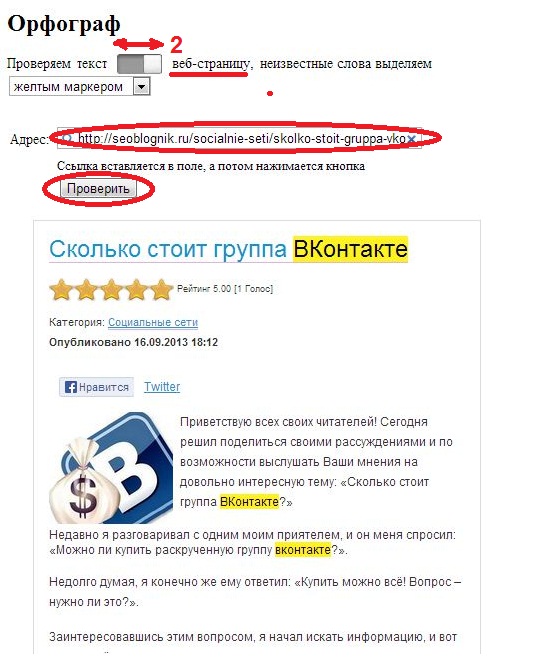
Service "Yandex.Speller"
Yandex.Speller is a service of our Yandex, designed to check spelling and correct spelling errors in the text. Yandex.Speller is currently able to recognize 3 languages (Russian, English, Ukrainian).
After you have inserted the required text into the verification form and clicked “check text”, a window will open in front of you with all the errors found. You will be required to either skip the erroneous word or replace it with the suggested one. Also, Yandex offers webmasters to install the same spell check form on their website. Personally, I really liked this service and will use it in the future.
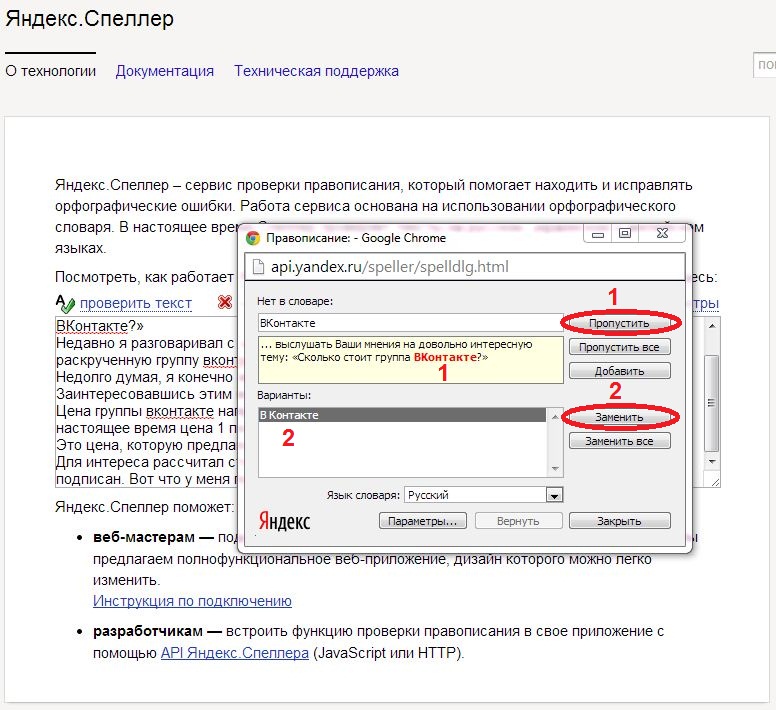
Service for checking at a given page address using Yandex
Yandex.Web page check – Checks for errors on a specific page of the site. We enter the page address, click “Check” and after a second we see the results of the check with errors underlined with a yellow marker.
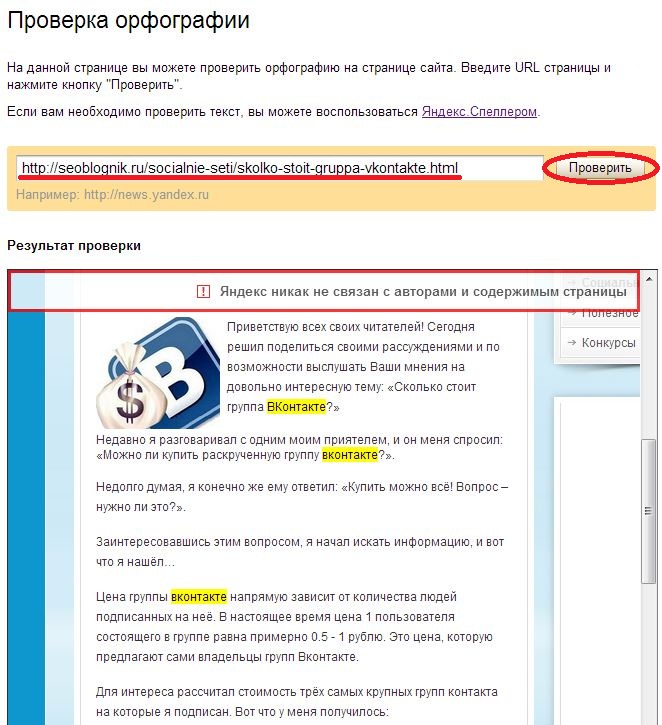
Online service "Advego"
Advego – A tool for checking spelling errors in the text of a well-known content exchange. The tool is multilingual and supports about 90 languages! So you can check errors in the text in many languages of the world. The default language is Russian. As elsewhere, you will need to insert the required text into the verification form and click the verification button.
As a result of the check, the service will highlight all the words with errors and provide detailed text statistics (number of characters, number of characters without spaces, number of words, number of unique words, number meaningful words, number of stop words, water, number of grammatical errors, classic document nausea, academic document nausea)
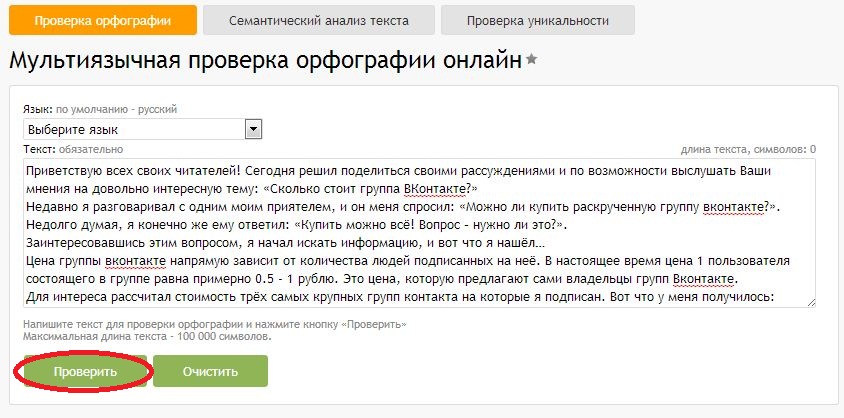
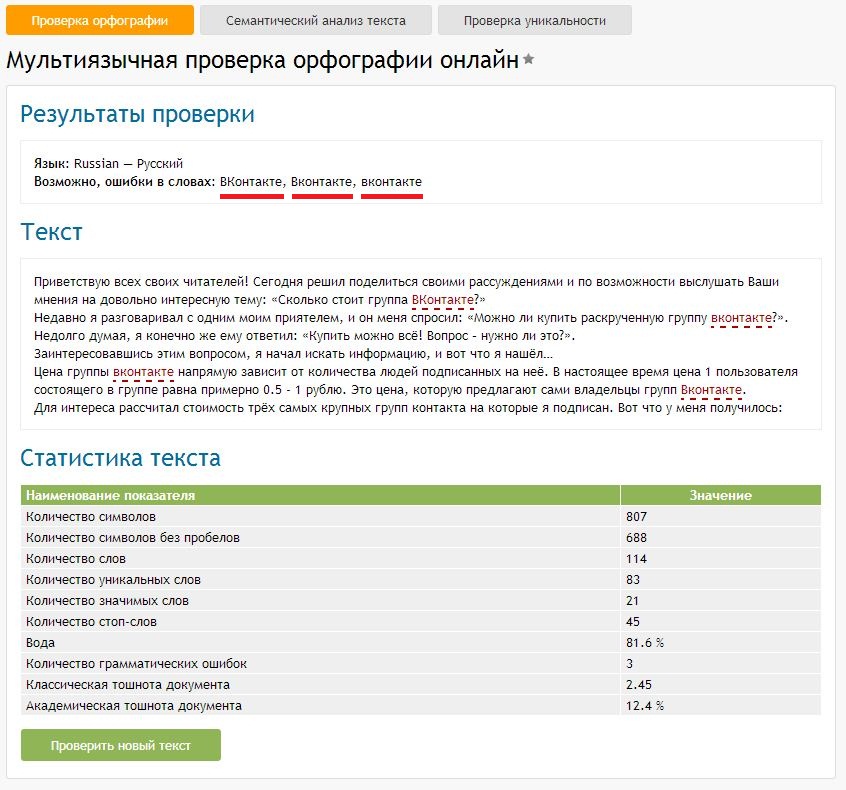
How else can you check punctuation?
For reference, punctuation is a system of punctuation marks, as well as the rules for their placement.
After a long search online services punctuation check, I still haven’t found the right one online tool who coped with the placement of punctuation marks at least as well as Microsoft Office Word. And this is not surprising, if machines can still somehow cope with correcting errors in words, then only a person can cope with the placement of commas in the text.
textis.ru – Still, if you don’t have Word at hand, this service will help you. You will need to enter the word that you are unsure of placing a punctuation mark in front of. In addition, the service will give you all the existing rules that are associated with this word and select examples of using this word in a sentence.
